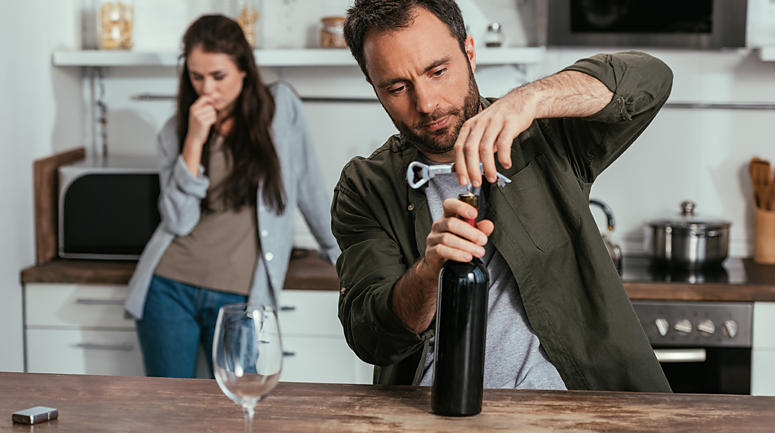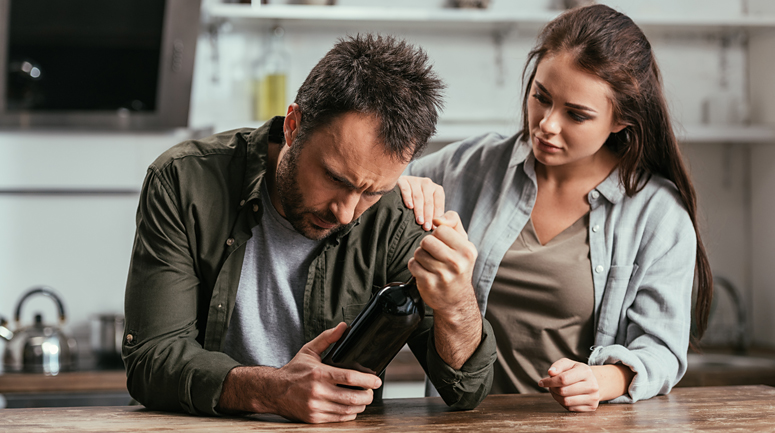Effective Ways to Help an Alcoholic Partner
If you have a husband, wife, or partner with alcohol use disorder (AUD) you may feel helpless, frustrated, and overwhelmed on how to help them. Witnessing your intimate partner struggle and fall back into the shadow of alcohol can take a toll on you. You’ve seen their mood change, and their behaviour turn against you, and it’s upsetting to see when you only want to help them heal.
While the decision to get help lies on the alcoholic, it’s not a lost cause. As their partner, you have the unique opportunity to point them in the right direction.
Here, you’ll discover how you can spot the signs of alcohol addiction, how to do the all important “talk”, and how you can be a pillar of strength for your partner as they journey through their recovery.

Does My Partner Have an Alcohol Addiction?
Alcoholism can be tricky to identify. For example, just because your partner often goes out for drinks at the pub or loves wine during dinner dates doesn’t mean they have an alcohol addiction.
The main thing that separates alcohol addiction is that your partner’s life has been negatively affected by alcohol. They no longer have any control over their drinking, which can damage relationships, their work life, and even neglect previous hobbies that used to spark joy for them.
Here are some signs you can look out for:
There’s a change in their mood and behaviour
What’s sad about alcohol addiction is how it can quickly change people’s behaviour. Even the best people under the influence can suddenly turn intimidating, aggressive, and worse–violent.
They seem to have “lost” themselves and have become quick with their anger and lash out. They also become neglectful of what they hold dear, like children, family, or their passions in life.
If your partner turns to violence frequently, then it’s time to leave right away to protect yourself and your children. The best way is only to help them from a distance and prioritise your own well-being as well as your kids.

Going out to drink and keeping it secret
Another sign is when they regularly go out to drink without telling you, going back home drunk, and not being completely honest with you. They could also be drinking alone or intentionally going out with drinking buddies. If this happens, you can either talk to them about it or their friends and acquaintances to get the full picture. This way you can understand what lies behind their alcoholism.
Hiding finances from you
If your partner has an alcohol addiction problem, then it’s most likely costing them money. If you find them trying to hide their current finances, skimping on bills, and don’t know where their money suddenly disappear to, then this might be a telltale sign.
If your partner exhibits any of these signs, then it’s a sure sign they need professional help. You can reach out to our team of specialists to learn about the next steps on getting your partner treatment for their alcohol addiction.

How to Talk to Your Partner about Alcoholism Safely
It’s never easy to approach your alcoholic partner about their alcohol addiction. There’s fear that they wouldn’t listen or will only lash out. That’s why the best way to talk to them is only when they’re sober and not hungover.
Speak to them honestly how their alcohol consumption have negatively affected your relationship. This can either be:
- Your relationship and intimacy with them
- Their neglect towards your children (if you have any)
- How their behaviour changed (intense anger, aggressiveness, or violence)
The important thing here is to be honest with them and let them know that you are open to listening to what’s really driving this behaviour. However, if they start being violent, it’s important that you keep you and your family safe.
According to a study, men are six times more likely to commit domestic abuse when they struggle with alcohol addiction. Detach yourself and your family if this persists and make sure to look out for yourself as well.
This can be very hard to experience and will likely negatively affect you and your children. If they refuse change, it might be necessary to be firm with your decision to walk way so they may eventually realise that they need help.

Fast Access to Residential Treatment
We are currently able to offer fast access to private inpatient treatment.
Please call us today and speak to one of our expert advisors.
Call today in confidence: 0800 0148 970
The Importance of Not Enabling an Alcoholic Partner
Sometimes, people don’t even realise that they are already enabling their partner with their alcoholism. The important thing is to identify these enabling patterns and keep your partner accountable for their actions.
You must never enable their drinking habits, even if they insist they don’t have an alcohol problem. Most alcoholics are in denial, and if you start to see the opposite, it’s best to keep them in check.
Remember, while you can’t change them, you can decide what you allow in the household.
Some ways to avoid enabling them is by:
- Not drinking alcohol with them – monitoring their drinking doesn’t help and
will only reinforce the habit and make the situation worse - Avoid places where they usually serve drinks like pubs
- Don’t give them money – most financial help will only be used to buy alcohol
Your participation in keeping them accountable and not enabling them is highly crucial for them to realise that they have an alcohol problem. This way, you can easily encourage them to seek the help that they need.
How to Help an Alcoholic Husband or Boyfriend
Talking to your alcoholic husband or boyfriend about their alcohol addiction can be both tricky and dangerous. While most people can acquire alcohol use disorder, men are most likely to develop this.
Because of the patriarchal society we live in, there’s the traditional perception that men should be “macho” and should never share their emotions. The stigma around men showing their emotions is still widespread, and this results to them bottling their struggles. Therefore making their dependency with alcohol even worse.
Alcohol is a powerful depressant and can greatly affect their behaviour and may even lash out to their loved ones. It’s an unhealthy cycle and can also irrevocably damage the people around the alcoholic.
The best way to help them is either get an alcohol intervention with their family and close friends. Meet up with him and discuss the problem with compassion and patience. However, if abuse perpetuates it’s best to detach yourself first in order to protect yourself and the children.

How to Help an Alcoholic Spouse or Partner into Treatment
The first step towards their treatment journey is for your alcoholic partner to decide for themselves that they want to get help. Once this crucial step has been done, you can help them find residential treatment options.
You can help them research and assess options, find out what they like, and assure them that you will be with them every step of the way. Advocate for them and point them to alcohol rehab centres with good background.
The vital key here is that you you’ll reassure them of your support. Some alcohol rehab centres have visiting options, or if not you should communicate with them frequently via text or call. You can also ensure that their home life will be taken care of while they’re away. So they can just focus all of their energy towards recovery.

What lies behind us and what lies before us are
tiny matters compared to what lies within us
What to do next
Watching your partner lose themselves to alcohol addiction can be heartbreaking. It can feel like an uphill battle, but remember that you are not alone in this journey. We can direct you to the best and most effective rehab treatment centres. Like thousands of people we have helped, you and your partner can reclaim your lives without the shadow of alcohol addiction. Get in touch with our team of compassionate experts, and we’ll help you find the best treatment options.

5 ways to help while your partner is in treatment:
- Visit them regularly if the rehab centre allows, and if not regularly call or text them. Treatment can feel very isolating, and it’s crucial that they feel their loved ones still care and support them. This can also help them feel motivated towards their recovery journey.
- Give them assurance that things will be taken care of while they are away for treatment. The number one goal is to help them feel less worried about the outside world so they can spend all of their energy in getting better.
- Remove potential triggers from your home once they go back. It can be a difficult transition for them after getting out of rehab, so it’s vital that there are no alcohol, meds, and other potential triggers in sight.
- Take care of your well-being while they’re in treatment. Join an Al-Anon group, get counselling, or dedicate time for self-care. Living with an alcoholic or helping an alcoholic can be damaging, and you also need to recover from the invisible wounds alcoholism have inflicted on you.
- Join family therapy if possible. Some rehab centres offer this as well and this can be a really good way to recover from the past hurts and damages that alcohol addiction have inflicted on your family as a whole.
Can I Force my Husband or Wife into Treatment?
The truth is that, you can’t force your partner to get treatment. They have to be ready to make a change themselves. In order for treatment to be successful, it needs to start with the person’s heartfelt desire to be sober.
And you can help your alcoholic partner reach this by talking to them with compassion. Help them see how they can reclaim the joy in their life with sobriety. Converse, listen, and as always respect their boundaries too.
Some alcoholics need time to reflect and fully realise how alcohol took over their life before they can make this change. Only when they are ready can you become proactive in getting them to alcohol rehab centres and other treatment options.
Reassure your partner that you will support them even if they may be hesitant to get treatment at first. Your unerring encouragement can be a huge factor in how they decide.
It might be hard to do it all on your own, so the best thing to do is to reach out to other family members, friends, or parents to help you. You can do an intervention, as long as it’s properly managed.
If you want your partner to have this intervention ASAP, we can help you connect to professionals that know how to do this for you.
FREE Alcohol Addiction Assessment
If you or a loved one are struggling with alcohol addiction, we understand the challenges you’re facing and we’re here to offer compassionate help.
Our highly trained advisers are available to speak to you right away, simply call 0808 252 3379 today.
We can discuss your concerns in complete confidence, explore the options for treatment, and help you to understand what will work best for you.
We’ll also help you to book your free alcohol addiction assessment there and then, with appointments usually available within only a few days.
We understand that taking the first step can be the most difficult, but we’re here to support – with no pressure or judgement.
Professional and compassionate help is just a phone call or click away.




